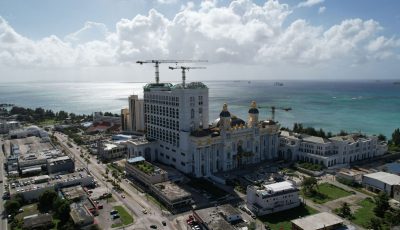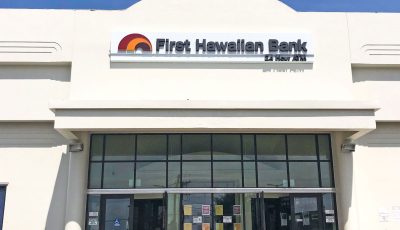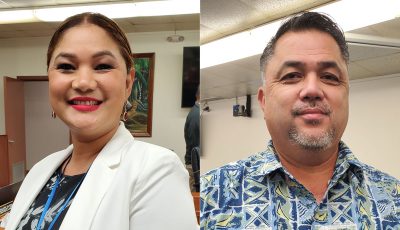A home called ‘yes’
“Integrated development” is a phrase used in the ’60s when economic, political, and cultural factors were simultaneously considered in planning community designs, though international funding agencies hardly heeded their own rhetoric in engaging population of affected areas in resource development and production schemes. Piddly amounts were handed to NGOs to look after the “cultural” aspect, and gloss over the political to keep everyone happy.
Now fancied as the manner of Best Sunshine International Ltd.’s undertaking in its casino program, it uses the euphemism first used in Singapore as “integrated resort.” The casino is but an ingredient, albeit, the umbrella to the construction of hotels, restaurants, shopping and convention centers, theaters, museums and theme parks. Best Sunshine out of HK is marketing its excavations on Saipan as an “integrated resort” in the manner of the Marina Bay and Sentosa models out of Singapore.
Already, community leaders intent in preserving cultural identities by keeping meticulous historical records of the Chamorro and Carolinian heritage at the excavation site (the word “Chamolinian” which we had the misfortune of using as a unity word is actually a euphemism to gloss over historical differences, I was properly told) are crying out “foul” for the shoddy treatment being given the findings and how they fit in the scheme of things.
When a car dealership manager was asked why his maintenance crew was storm-boarding the glass of his display room a few weeks back, he pointed to the path of Typhoon Dolphin pasted on his office door. At the Finasisu Terraces, the maintenance crew put up the storm boards on the windows, too, double-checked the power generator and the well’s water pump that became useful when CUC experienced interruptions.
We generally tend to be apathetic until a crisis situation gets us to be active. We are on denial about the gross implications of things like climate change, ignoring the threat until it is in our doorsteps. As the reality of the Chamorro-Carolinian divide once again is manifest, the tendency to gloss over differences is high.
The same holds true to the illusions of economic growth in global economics, the language of progress when enterprises are based on resource use, rapid mineral extractions, and cheap manufacturing for goods that depend on other developing countries’ exploited labor, even imported ones as we experienced during the heyday of the garment industry in the CNMI. The bottom line at the quarter’s end is attended to; habitat and ecology suffer.
The dam of denial breaking to face what is authentic is the optimistic view, as boarding one’s display room when an imminent typhoon makes a call. French-owned FHB chooses to engage in strategic hope in its “It all starts with Yes” ads. Humans can create sustainable ways of being on this planet, it implies. This hope goes beyond just being a PR piece. FHB incarnates it in the here-and-now where it operates.
OK. Not that FHB is losing any sleep over it, but the notion of operating out of “Yes” rather the indifferent “I will think about it,” or the blatantly self-defeating, “it is impossible”, does matter.
The typhoon that visited the Marianas last month was par for the course that came and went with the geography. We overcame. Rota’s food supply needed adjustments but no one died of starvation.
It is the damage that banks inflict when they face up to the fact that wealth by today’s definition is a mirage requiring a public bail out to readjust dependency on currency usage. Assets in round-the-clock portfolios rather than in actual production of goods increase paper value but not real wealth. Banks keep audit notes then add the illusion of value to the act. Employ in an arm of a financial service is the preferred white-collar profession of many.
“Yes” in the reality of climate change, for instance, suggests facing CO2 emissions against an escapist “let’s get the vehicles ready to fly to the moon” that Texans talk of to start human colonies in outer space, abandoning a doomed Earth!
The data is daunting. Where water was before, there is drought. Where water was once scarce, there is flood. Earthquakes are stronger and the damage deeply felt as social congestion invites substandard housing. We self-inflicted miseries by addiction to quick profit and greed on gain.
We find escape routes from the congestions of urban centers until we discover the plastic wrapper sticking out of the Saipan sand shore. There is no escape even in the pristine atolls of the Marshalls. We cry against the rapid despoiling of surrounding. But if we surrender ingenuity and creativity to ennui, we lose out to chance!
“Yes” is a choice of hope where conservation of natural resources abides, the workforce participates in the decision-making process and the ownership of production means, and distribution channels have built-in values on equity and equality. It is an option we can make!
The home called “Yes” is now totally and inescapably the planet Earth. We will guard the option in the CNMI!



























